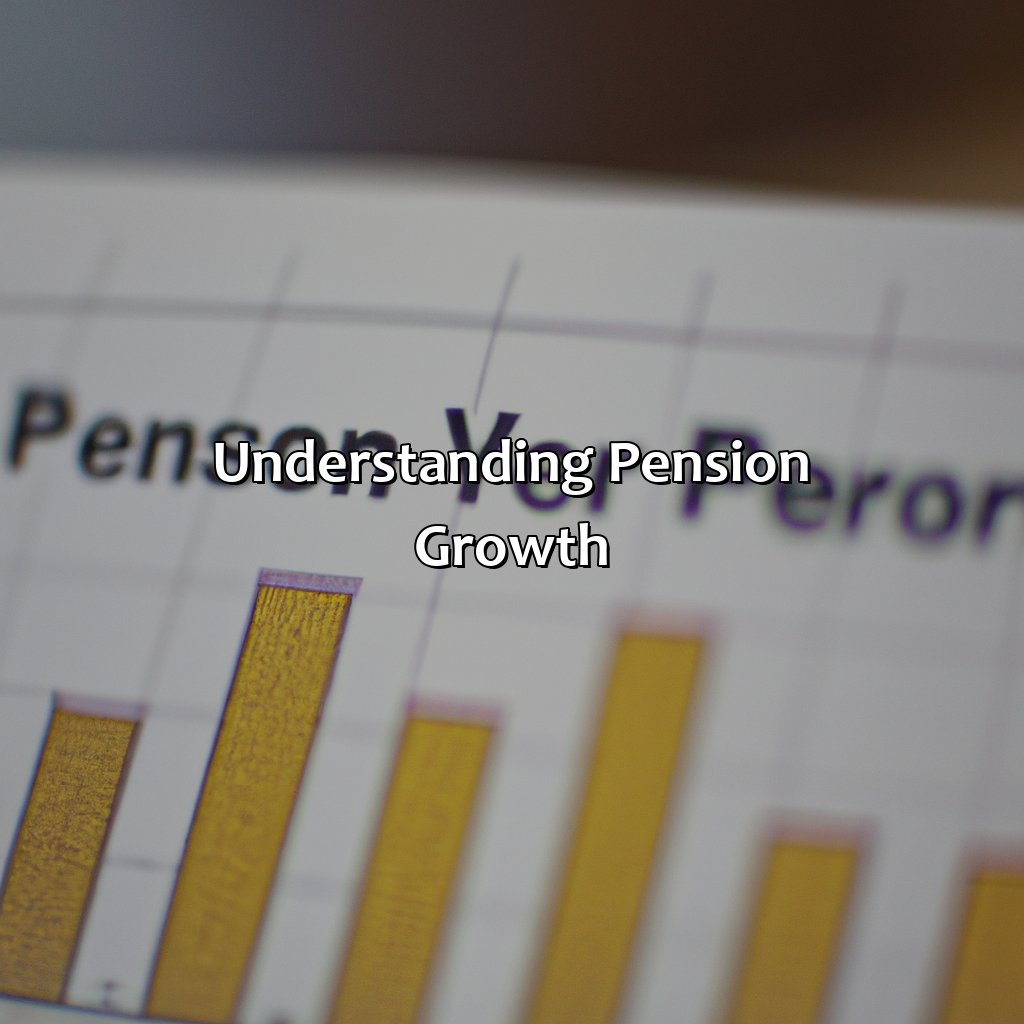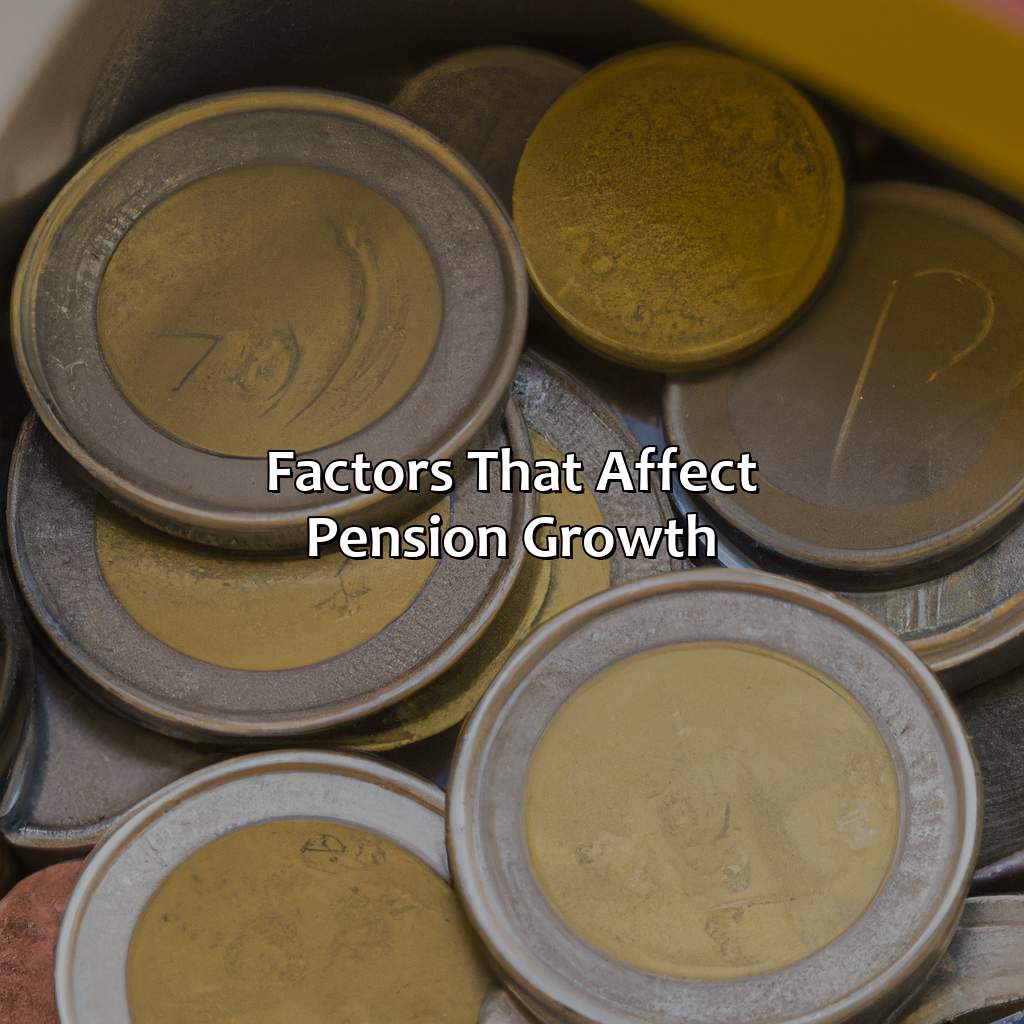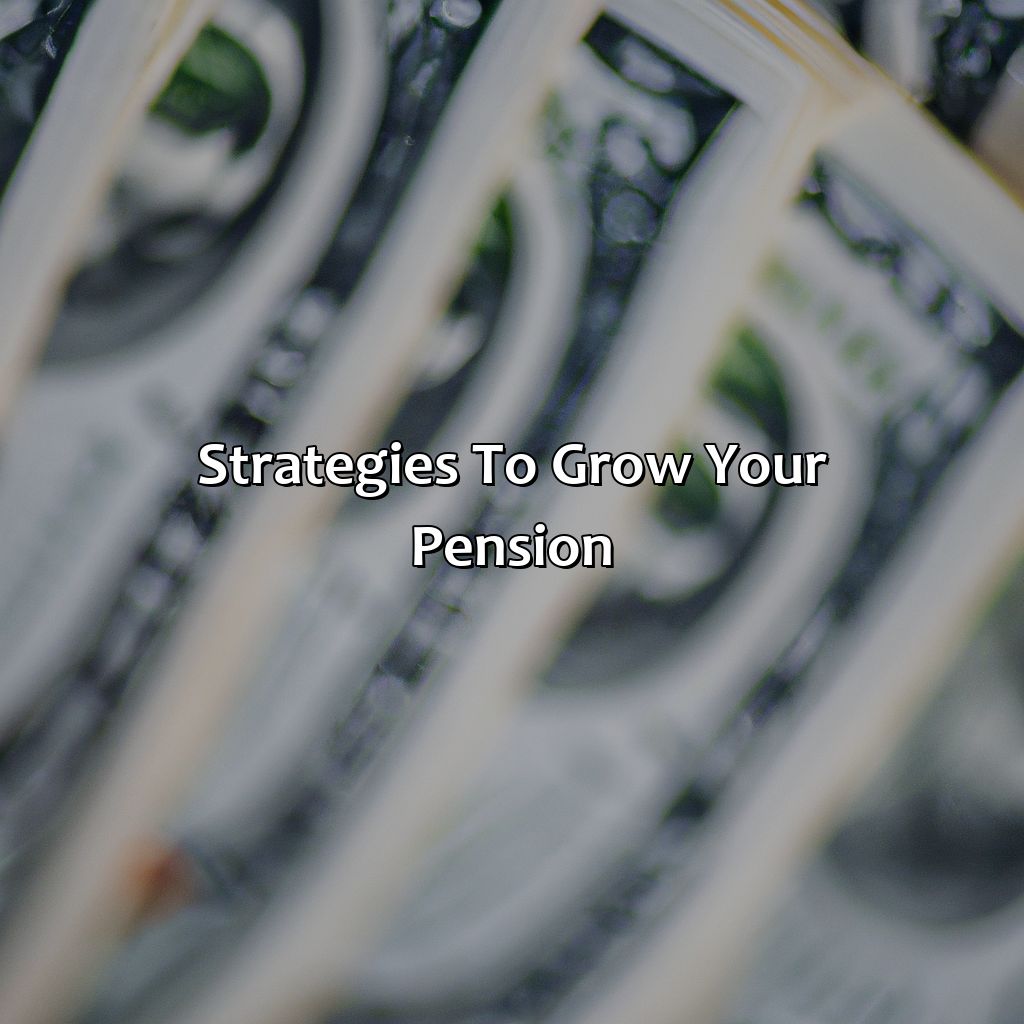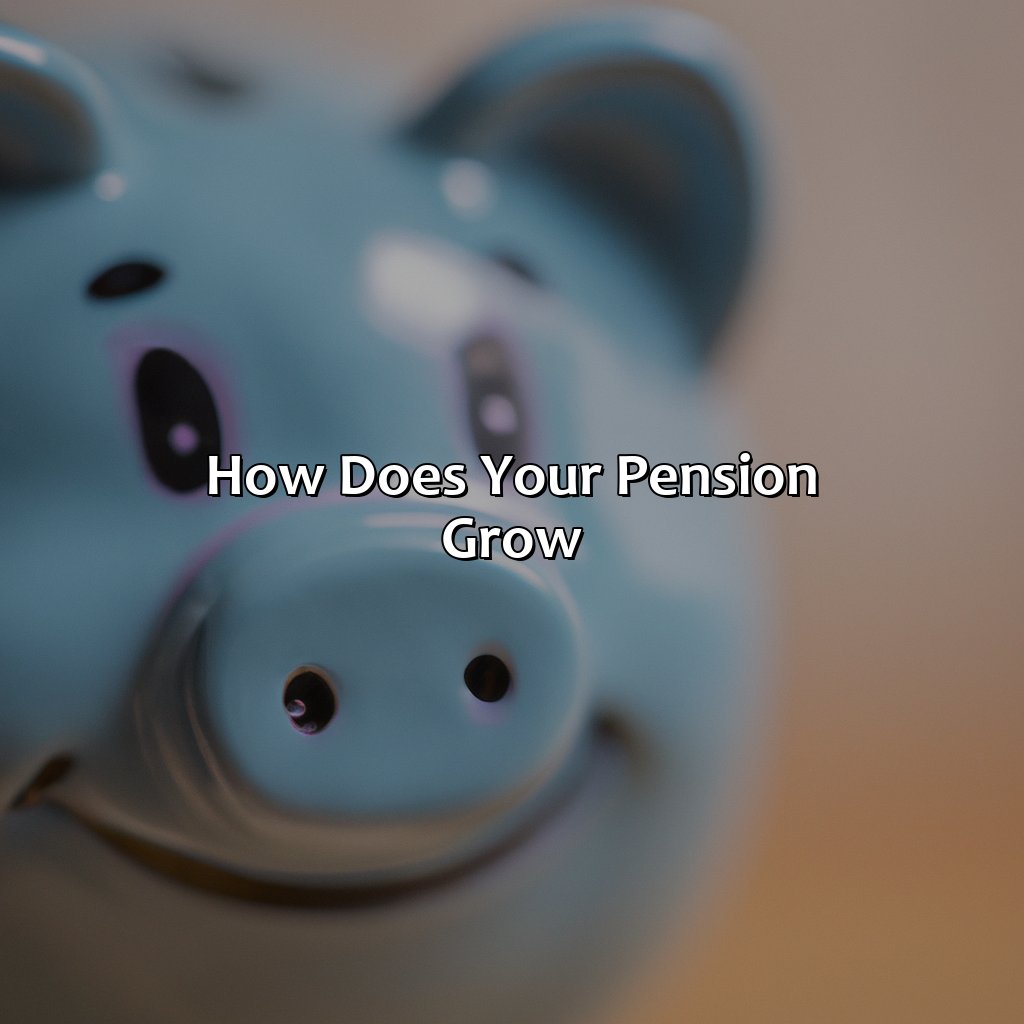How Does Your Pension Grow?
Key Takeaway:
- Understanding pension growth is important for planning for retirement. Pension growth is the increase in the value of your pension over time.
- Factors that affect pension growth include investment returns, contributions, fees, inflation, and time. Choosing the right investment mix and increasing contributions can help boost pension growth.
- Consolidating pensions and regularly reviewing and adjusting your pension strategy can also help maximize pension growth and ensure a comfortable retirement.
Do you want to know how to make your pension pot grow? You can take simple steps to ensure a comfortable retirement. In this blog, you’ll discover how to make your pension fund work for you.
Understanding pension growth
Understanding Pension Growth: How Your Retirement Savings Can Grow
Your pension savings could grow through several means, including interest, investment returns, and employer contributions. Interest applies to defined benefit pensions, where the pension provider guarantees a set amount of income in retirement. Investment returns can vary based on market fluctuations, as these pensions have a defined contribution structure that can fluctuate in value. Employer contributions can also increase pension savings, as employers may offer matching contributions.
It’s important to note that pension growth can depend on the pension plan type and investment choices. Consult with a financial advisor to understand which options are best for your retirement goals.
A study by Fidelity found that it’s important for women to save more for retirement, as they typically live longer and earn less than men.

Image credits: retiregenz.com by Yuval Duncun
Factors that affect pension growth
Grasp how your pension grows? Learn the main factors that affect it. This section “Factors that affect pension growth” explains them. The subsections- ‘Investment returns, Contributions, Fees, Inflation, and Time‘ – will help you understand how each factor can affect your pension fund’s growth.

Image credits: retiregenz.com by James Jones
Investment returns
The performance of investments is a crucial factor in the growth of one’s pension account. Different types of investment vehicles, such as stocks, bonds and real estate, offer varying returns that can affect the overall growth rate of a pension account. Higher returns result in faster portfolio growth and increased retirement savings over time.
Investment returns also entail risks that may impact portfolio growth negatively. Interest rates, inflation, market volatility and economic uncertainties are factors that affect investment performance adversely. It is important to diversify one’s portfolio between various asset classes to manage risks effectively.
In addition to investment diversification, regular contributions towards a pension account also play an essential role in portfolio growth. Contributions made earlier in one’s career have more significant impacts and benefit from compound interest over time.
To maximise pension growth, it is advisable to seek professional advice and actively monitor one’s investments regularly. With strategic planning and careful consideration of risk management techniques and contribution strategies, individuals can achieve long-term financial security in their retirement years.
Why work hard when you can just let your contributions do the heavy lifting for your pension growth?
Contributions
The Impact of Your Contributions on Pension Growth:
In order to experience pension growth, making contributions plays a crucial role. By contributing regularly, your pension will accumulate and grow over time. The amount of money that you put into your pension fund has a direct effect on the final amount that you receive.
Moreover, it’s essential to note that the earlier you start contributing, the larger your pension pot is likely to be. Even if you’re only able to make small contributions initially, these can build up significantly over time thanks to compound interest.
Ensuring regular and consistent contributions might seem daunting at first, but in the long run, it will benefit your financial security during retirement. Failing to contribute or withdrawing money early can harm your financial future during retirement.
So don’t miss out on potential growth opportunities by not contributing today. Make sure to set yourself up for a secure financial future by starting early and remaining consistent with contributions.
Want to slow down your pension growth? Just add some fees, it’s like putting a speed bump in your retirement lane.
Fees
Expenses and their impact on pension growth
One of the crucial factors that impact pension growth is the cost of managing the pension fund. These charges, often known as ‘expenses’, vary depending on different providers and the services offered by them.
- The most common type of fees charged by pension providers are administration fees. This fee is charged for managing your account and carrying out transactions such as investing or withdrawing money.
- Another cost involved in growing your pension is investment fees. Pension providers usually charge this fee to cover the expenses associated with investing in stocks, shares, bonds or property.
- Advisory charges are also an expense linked with pensions. If you took financial advice from a professional connected with your provider, a fee may be charged.
- Some providers require exit fees if you wish to move your funds elsewhere. These dues can significantly reduce your savings; therefore, it’s essential to check for any exit fees before selecting a provider.
Other than these expenditures, one thing to keep in mind is that costs will fluctuate depending on various factors, including economic fluctuations and political instability.
It can be advantageous to stay informed about alternative providers’ costs and develop a broader understanding of how finance works.
Therefore, understanding all types of deductions levied while growing your pension can assist you in making smart decisions when picking a provider and investments.
Your pension might grow, but so does inflation – it’s like a cruel game of seesaw where the government always wins.
Inflation
The impact of rising prices on your pension fund is a critical component to consider for long-term growth. As the cost of goods and services increase, so does the general level of prices, which reduces the real value of your savings. This leads to an erosion in purchasing power over time, ultimately translating into lower returns from your pension fund.
Inflation not only shrinks the real value of your contributions but also affects future payments from your plan. When you retire, you will receive regular payments from your pension scheme. If inflation is high at that time, it could significantly reduce the value of these payments. Moreover investing in assets that provide higher returns than inflation can help offset this loss.
Therefore as an individual seeking long-term growth for their retirement savings; it’s crucial to choose a sustainable investment strategy accounting for inflation and diversify it with other investments such as bonds and shares.
A study reveals that historically, UK inflation has averaged 2-3% annually since 1990 until present times Source: Bank Of England (BOE).
Time flies when you’re putting money into your pension, but it crawls when you’re waiting for it to grow.
Time
Over time, various factors affect the growth of your pension fund. Your pension can grow as a result of contribution rates, compound interest on invested funds and Retirement Income Options. As time passes, the value of financial commitments increase; therefore, it is imperative that you start contributing towards your pension early in life to aid growth.
Compound interest on invested funds is one of the most substantial factors that play a role in the growth of your pension fund over time. The earlier you contribute to your pension, the longer your investment has to grow through compound interest. Therefore it is necessary to make sure that you choose a suitable investment plan for long term gain.
In addition, retirement income options play a vital role in determining how much your pension will grow over time as they majorly impact security and sustainability. Choose an income option wisely and regularly review it to ensure that it is adjusted according to current life situations so as not to miss out potential opportunities for growth.
If you do not start contributing towards your retirement fund at any stage of life, you may end up missing out on significant growth possibilities over time, resulting in an inadequate sum later on. By keeping a close eye on investment plans and contributions and making adjustments accordingly where necessary ensures you don’t fall behind in securing financial wellbeing post-retirement.
Growing your pension is like growing a plant, both require a lot of patience, TLC, and a desperate hope that you won’t accidentally kill it.
Strategies to grow your pension
Want to expand your pension? Increase contributions and select the best investment mix. Consolidate your pensions, too! Keep up with regular evaluations and alterations. This advice will help you reach maximum pension growth and a comfortable retirement.

Image credits: retiregenz.com by Harry Woodhock
Increase contributions
To enhance your pension plan, there are methods to increase the amount of money you contribute towards it.
- Augmenting your contributions on a regular basis paves the way for a good retirement income.
- You can also increase the percentage of your salary that goes towards your pension, ensuring greater monetary support in the future.
- If you’re an employer, giving employees tax-free contributions as a part of their reduced salary package is an effective method to augment their pension fund.
It’s vital to note that higher contribution levels lead to greater payouts at retirement. Hence, it’s advisable to select a contribution level that suits you comfortably.
Expanding your financial literacy by seeking qualified advice and consulting with advisors can enable you to make informed decisions to secure your retirement.
True History: A research conducted by an institute showed that contributing about 1% extra every year eventually enhanced one’s pension pot growth and enabled them to gain substantial returns at retirement.
Pick your investments like you pick your ice cream flavors- a mix of favorites, some you’re willing to try, and definitely no rocky road.
Choose the right investment mix
When it comes to maximizing your pension growth, identifying the right mix of investments is crucial. A smart mix tailored to your goals and risk tolerance could help you achieve long-term retirement success. The combination should ideally optimize earning potential while balancing any potential risks.
Diversifying across asset classes such as equities, fixed income, property or alternatives increases exposure to different types of markets and spread out risk. As you age, the investment mix shift gears from high-risk options to low-risk ones that focus on stable dividend-income generating assets.
It’s also important for investors to regularly review their portfolio and make adjustments based on market conditions or personal goals. By actively managing investments, an individual can ensure their assets are allocated appropriately for optimal growth.
Meanwhile, an independent analysis conducted by Willis Towers Watson has found that funds handled by external asset managers outperformed those managed in-house by institutions or trustees between 2020-2019.
Consolidate your pensions, because who needs the stress of multiple retirement accounts? Just keep all your eggs in one basket and hope that basket doesn’t drop.
Consolidate your pensions
Streamline your pension funds for growth. Consolidating pensions into one account simplifies tracking, reduces charges, and enables efficient investments. This is achieved by moving existing pensions to a modern pension scheme with low fees and flexible investment options.
Consolidated pensions offer better growth opportunities than multiple small accounts with varying performance rates. Grow your retirement pot by combining them into one modern scheme. This also assures easy management of contributions, tax dues, and withdrawals.
A unified pension fund provides more significant buying power and favors costing when investing in exchange-traded funds, shares, and other schemes without being charged multiple administrative fees on each account.
Don’t miss out on higher total returns for your consolidated pension funds through quality investments in diversified schemes offered by the new provider. Combining diverse vehicle type options as per personal preferences also reduces individuals’ exposure to volatile assets. Regularly monitor your consolidated account for optimal returns while eliminating underperforming asset types.
Review and adjust regularly
Regular monitoring and alterations are crucial for pension growth. Keep an eye on your pension’s performance actively to make the most of its potential and financial stability.
- Assess your goals: Begin by devising precise purposes for your pension, like retirement age and desired fund volume.
- Track progress: Sign in to access details regarding a pension, examining whether the forecasts match with actual advancements.
- Allocate wisely: While selecting investments for your pension, ensure to assess their performance histories, expenses, and likely future prospects carefully.
- Benchmark regularly: To monitor a pensions’ success levels by assessing against its peers’ performances with similar aims or asset performance comparisons.
- Make necessary alterations: If opportunities underperform or financial objectives shift, adjust or reorganize investments that may require attention regularly.
Indicators of good performance can vary across plans depending on participant demographics such as age ranges, investment horizons etc. Ensure you’re not just relying on past performance when you analyze it – geopolitical events also contribute.
Pro Tip: Use the services of professional investment advisors who can provide insights into what adjustments to make and how market trends affect different assets in your retirement strategy.
Five Facts About How Your Pension Grows:
- ✅ Pension growth is influenced by factors such as the amount contributed, the type of plan, and the investment performance. (Source: The Balance)
- ✅ Compound interest is a key driver of pension growth, allowing for exponential growth over time. (Source: Money Advice Service)
- ✅ Pension growth can be impacted by market volatility and economic conditions. (Source: Forbes)
- ✅ Making regular contributions and increasing your contributions over time can significantly boost your pension growth. (Source: Investopedia)
- ✅ Understanding the fees and charges associated with your pension plan is crucial in optimizing pension growth. (Source: Money Saving Expert)
FAQs about How Does Your Pension Grow?
How does your pension grow?
Your pension grows through contributions from you and/or your employer over time. These contributions are invested in various financial instruments, such as stocks or bonds, and generate returns that help grow your pension fund.
How much will my pension grow?
The growth of your pension fund depends on several factors, including the amount of contributions made, the rate of return on your investments, and the length of time your contributions remain invested. You can use a pension calculator to estimate how much your pension fund may grow over time.
What types of investments are used to grow my pension?
Pension funds typically have a mix of investments, such as stocks, bonds, and real estate. The exact mix of investments may vary depending on the risk tolerance of the fund and the goals of the fund manager.
Can I choose how my pension contributions are invested?
It depends on your pension plan. Some plans offer investment options that allow you to choose how your contributions are invested, while others have a default investment option chosen by the plan manager. Check with your plan administrator to find out your options.
What is the average rate of return on pension investments?
The average rate of return on pension investments can vary depending on the fund’s investment strategy, the economic climate, and other factors. Historically, pension funds have generated an average return of around 8% per year, but past performance is not necessarily indicative of future results.
What happens to my pension when I retire?
When you retire, you can start drawing income from your pension fund. The amount of income you receive will depend on the size of your pension fund, your age, and other factors. Some pension plans offer options for taking your pension as a lump sum or as regular payments over time. Check with your plan administrator for more information.


